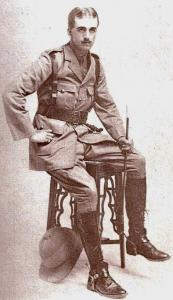
|

|
| Lieutenant Horace Lincoln Cyril MCCONNELL MC | |
|
Indian Army Reserve of Officers attached to 14 Squadron Royal Flying Corps Date of birth: 10th June 1892 Date of death: 24th November 1917 Died of wounds aged 25 Buried at Damascus Commonwealth War Cemetery Row A Grave 82 |

|
| Horace Lincoln Cyril McConnell was born at Sturminster Newton in Dorset on the 10th of June 1892 the son of the Reverend Charles James McConnell, Rector of Pylle, and Commissioner Beatrice Howard Jackson (nee Lowe) McConnell of Pylle Rectory, Shepton Mallett in Somerset. He was christened at Sturminster Newton on the 31st of July 1892. He was educated at Lancing College where he was in Olds House from September 1907 to July 1909. He was commissioned as a 2nd Lieutenant in a battalion of sappers and miners in the Indian Army Reserve of Officers on the 27th of November 1914. While serving in Mesopotamia he was seconded to the Royal Flying Corps and was appointed as a Flying Officer on the 19th of July 1917 and was posted to 14 Squadron the same day. He served in India, Egypt and Palestine. On the 10th of November 1917 he volunteered to attack a single span cantilever bridge over the Wadi es Surar, near Junction Station, in order to cut and isolate two branch lines of the railway between Jerusalem and Bathsheba. He was to fly with another pilot, Lieutenant Henry Hanmer, in their BE2es and each drop a 100lb bomb from a height of 500 feet. Unfortunately the bomb load was too much for a BE and there was no one available with the expertise to properly fuse and arm the bombs. They enlisted the help of a young Gunnery Officer and took off for their target. In the event, although they managed to drop their bombs, neither exploded and no damage was done to the railway line. During the attack McConnell's aircraft was hit by ground fire over the target, his aircraft was brought down and he was captured by the Turks. Although his aircraft was also hit, Hanmer managed to make good his escape due to a bullet being deflected by his cigarette case and only slightly damaging his rib. He landed safely back at base. McConnell was taken to a hospital in Damascus where he died of his wounds two weeks later. For this action McConnell was awarded the Military Cross which was announced, with no citation, in the London Gazette of the 11th of April 1918. |
|
| Olds House |
Back